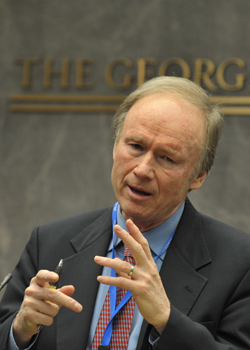Beyond the Written Opinion: When Justices Speak to the Public
In the last panel of the symposium, speakers discussed the occasions when Supreme Court justices speak to the public outside of their official discourse.
Christopher Schmidt – Beyond the Opinion: Why Do Supreme Court Justices Talk to the Public?
Professor Christopher Schmidt presented on the extrajudicial voice of the Supreme Court—what motivations lead justices to address the public beyond their written opinions? Schmidt used the life of Justice Hugo Black (1886-1971) as a case study in this topic. After an early avoidance of the public, Black in his later years sought more direct ways of speaking to the public outside of his Court opinions. Black used these occasions variously to defend himself when accused of changing his jurisprudence and to protect the Court when he felt its legitimacy was threatened.
Building on the specific example of Black, Schmidt listed common motivations that cause most justices to speak beyond their opinions. One such motivation involves personal reasons—often, justices wish to relate their own personal stories to the public, as in the case of William O. Douglas, who wrote memoirs and an autobiography. In other instances, justices may address citizens for the purpose of providing general legal education on the Constitution, the Supreme Court, or a particular case. In particularly controversial instances, justices may wish to speak to the public in order to protect and uphold the institutional legitimacy of the Supreme Court. If justices feel that the mainstream press is not accurately reporting cases, they may try to correct public perception of their decisions. Finally, some justices address the public out of jurisprudential motivations—they wish to articulate their own personal views on law and justice.
Schmidt has written extensively on the Supreme Court and legal history. His current book project, titledCreating Brown v. Board of Education: Law, Ideology, and Constitutional Change, 1941-2007, examines the political and intellectual context behind the Supreme Court’s landmark 1954 school desegregation decision and efforts of subsequent generations to redefine Brown’s meaning and significance.
Visit Professor Schmidt’s SSRN and Bepress pages to read more of his scholarship, including “‘Freedom Comes Only from the Law’: The Debate Over Law’s Capacity and the Making of Brown v. Board of Education,” “Oral Dissenting on the Supreme Court” (with Chicago-Kent faculty member Carolyn Shapiro), and “Brown and the Colorblind Constitution.”
Professor Schmidt was joined in the last panel by speakers Jason Mazzone (Illinois), Jeffrey Rosen (George Washington), and moderator Sheldon Nahmod (Chicago-Kent).



Leave a Reply